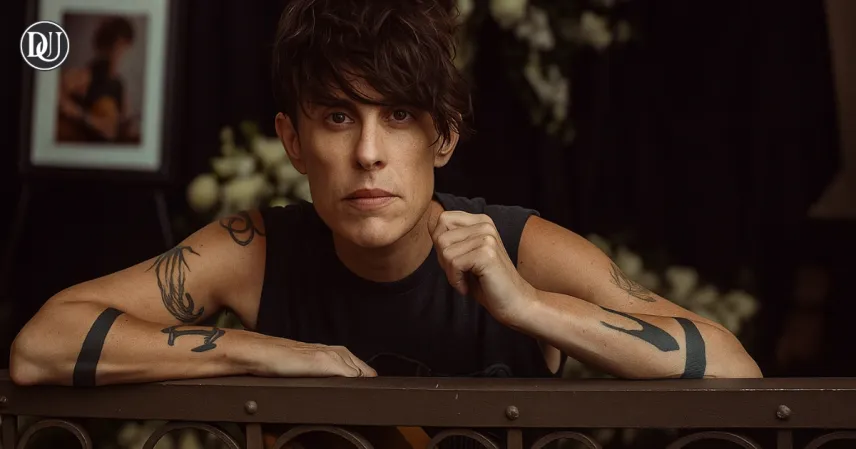Hearing Andrea Gibson passed at 49… that just hit different, didn't it? Like, it feels so profoundly unfair, you know? They were such a unique voice, honestly. The Economic Times called them a "fierce and tender poet of a generation," and AP News mentioned them as a "candid explorer of life, death and identity." That really sums it up, doesn't it? It's just wild to think about someone who brought so much clarity and raw emotion to the world being gone so soon.
The Voice That Cut Through 🎤
They just had this way of making you feel seen, always. I remember the first time I heard their spoken word, it was like a gut punch in the best possible way. Not many artists can articulate vulnerability and strength with that kind of raw honesty. They spoke so openly about mental health, gender, sexuality – stuff that many people still tiptoe around, even now, you know? And it wasn't just what they said, but how they said it. Their delivery was just... captivating. You couldn't look away. You really couldn't. It felt like they were peeling back layers of themselves, and in doing so, somehow, they were helping you peel back yours too. Is that really surprising, given the power of genuine connection? I don't think so.
More Than Just Words 💔
It's weird, but their poetry felt less like something written on a page and more like a direct conversation with your soul. They’d tackle things like social justice issues, the personal struggles of living in a world that isn't always kind, or the sheer messy beauty of love and heartbreak. And you’d just feel it, deep down. It was never preachy, always just… real. They had this incredible ability to make the universal feel deeply personal, and vice versa. It’s a gift, really. Not many possess that, I think. Their words often had this quiet intensity, a kind of gentle force that just wrapped around you and made you feel understood. Honestly, it was never about clever rhymes or complicated metaphors, it was about truth, laid bare.
A Legacy of Vulnerability ✨
You know, they were so open about their own struggles, even their battle with ovarian cancer. That level of vulnerability, especially when facing something so immense, it’s just inspiring. AP News mentioned a documentary was even made about their life, which I really need to track down, by the way. It makes you think about how art can be such a powerful way to process pain, not just for the artist, but for everyone who listens. And their poetry became this beacon, basically, for so many people who felt unheard or unseen. It really did. They created these spaces, whether at a live show or just in the quiet of your room reading their words, where you felt completely safe to be yourself, flaws and all. And that's rare, honestly.
Navigating Life and Loss 🎗️
Their work often circled back to themes of resilience – how to keep going when things fall apart, how to find beauty in the broken pieces. And in a way, knowing they were battling cancer for a while, it adds another layer to their poems about life and death. It makes you reflect on the fragility of existence, but also the enduring power of connection. Could be wrong, but I always felt like their words gave people permission to just... feel everything, the good and the bad. Which is crucial, honestly. They never shied away from the grief or the pain, but somehow, they always managed to weave in threads of hope, or at least acceptance. It wasn't about avoiding the hard stuff, it was about walking right through it, and somehow, coming out stronger.
Impact Beyond the Page 🌍
Honestly, their impact went way beyond just literary circles. They built this community, almost, around their performances and their online presence. People from all walks of life connected with their messages of acceptance, love, and radical empathy. I’ve noticed a lot of younger people especially really gravitated towards their work, probably because it spoke to a lot of the anxieties and hopes of this generation, you know? They basically fostered a space where it was okay to be exactly who you are, messy bits and all. That's a huge deal. Their tours were legendary, I hear, selling out venues, creating this incredible energy where audiences felt like they were part of something bigger. It wasn’t just a show; it was an experience.
Finding Solace in Their Art 🌟
It’s like, when you listened to Andrea Gibson, you felt less alone. Their words were a form of solace, a warm blanket for the soul when things got rough. They had this way of putting words to feelings you didn't even know you had, or couldn't articulate yourself. And that's what good art does, right? It helps you understand yourself and the world a little better. Their death is a real loss to the poetry world, to anyone who needed that specific kind of raw, tender truth. But their work, that’s going to live on. It really is. The way they spoke about love, about heartbreak, about finding strength in vulnerability – it's timeless. I mean, think about how many people they've probably helped just by putting their own truth out there. It’s immeasurable, honestly. And I think that's the most important thing to remember right now. Their legacy will continue to inspire, to comfort, and to challenge.
Anyway, just wanted to share that. It’s been on my mind. Sorry for the late-night rambling. Guess some thoughts just hit you out of nowhere and you gotta get 'em out.










